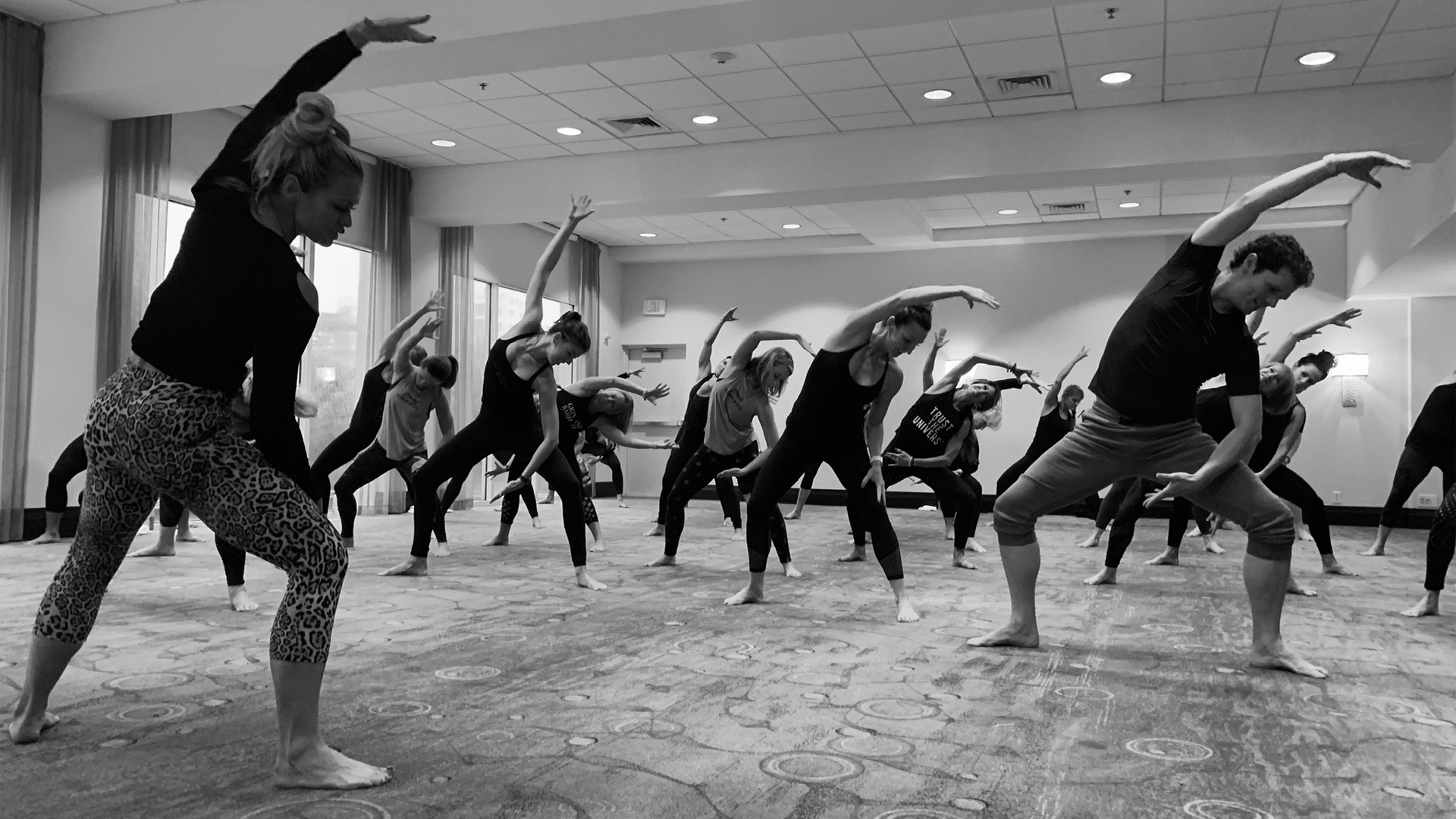All Categories

As a fitness professional, you might think you don’t need a personal trainer. After all, you know the ins and outs of exercise and proper form, right? Let me share a story that opened my eyes to this mistake so many fitness professionals make.
I was attending a fitness conference a few years ago when I struck up a conversation with a seasoned personal trainer. He had over two decades of experience under his belt and the success of his boutique fitness studio spoke volumes about his dedication to the craft of personal training. During our chat, I asked him about his own workout routine. He casually mentioned that he hadn’t had a workout supervised by another personal trainer in over a decade. This revelation struck me. Here was a professional who undoubtedly knew everything about exercise, yet he was somehow missing out on a crucial aspect of his own business and profession—supervision.
Our conversation made me realize that understanding the value of our profession as personal trainers means embracing the benefits of having an expert oversee our own workouts. A personal trainer who truly understands the value of their role will always prefer to be put through a workout that is supervised by a fellow expert. It isn’t just about ensuring proper form or preventing injuries (although we do); it’s about optimizing every rep, every set, and every workout to achieve the best possible results.
Unfortunately this gym owner is not unique. I come across fitness professionals or former fitness professionals all the time that say they don’t need a personal trainer because they “know what they’re doing.” Understanding what to do and how to do it is only one aspect of a fitness routine. Showing up and actually doing that routine with the intensity and focus required to see meaningful results over the course of months, years, and decades requires help from a personal trainer even for the most knowledgeable fitness professional.
The growing body of exercise research on supervised versus unsupervised workouts provides compelling evidence that supervised exercise not only enhances results but also optimizes the time spent on exercise. This is particularly significant, even for experienced exercisers who might believe they have mastered their craft. Studies show that individuals who engage in supervised training achieve better results in less time, making their workouts more efficient and effective.
Consider the typical challenges you and your colleagues face as seasoned fitness professionals: plateaus, burnout, lack of motivation, and diminishing returns on your efforts. Supervision by a fellow fitness professional can mitigate these issues by providing accountability, introducing new routines, ensuring proper form, and pushing you to your optimal limits. The external perspective of a trainer also brings fresh insights and tailored adjustments, which are difficult to achieve when working out alone. I can’t count the number of times I’ve been coached by another trainer on an exercise and it completely shifts the way I then coach my clients. Not to mention the peer pressure of being trained by another trainer is enough to push yourself to the limits even more than you normally would!
For experienced exercisers, the efficiency gained through supervised workouts is invaluable. With a trainer’s guidance, they can focus on exercises that yield the best outcomes, eliminating wasted effort on less effective routines. This means more time to enjoy other aspects of life while still making significant progress in their fitness journey.
It’s essential for us to understand that the value of our job as personal trainers is not just based on experience and anecdotal success stories, but it is firmly rooted in scientific research. This scientific backing is crucial, not only for validating our practices but also for enhancing our ability to sell our services and acquire new clients. Communicating why somebody would workout with you can easily be done by showing them that they will get better results in less time working out with you than they would on their own.
When we can confidently explain the tangible benefits of supervised exercise, backed by credible studies, we elevate our profession. Clients are more likely to trust and invest in a trainer who can demonstrate that their methods are supported by science. This is particularly important in an industry where misinformation can easily spread and clients may be swayed by the latest fitness fads.
Understanding and leveraging scientific research allows us to communicate the real, measurable advantages of supervised workouts. It’s not just about guiding someone through a set of exercises; it’s about offering a scientifically proven pathway to better results in less time.
The Influence Of Direct Supervision Of Resistance Training On Strength Performance (https://pubmed.ncbi.nlm.nih.gov/10862549/):
This study published in the ACSM Journal Medicine & Science in Sports & Exercise examined the effectiveness of supervised strength training versus unsupervised strength training workouts. The research aimed to determine the influence of supervision on both muscle strength and functional performance. I particularly appreciate this study because it focused on a relatively younger and active population (men ages 18-35). This largely represents the population in the personal training industry. This provides valuable insights into how professional supervision can optimize the performance and results of those already familiar with exercise. The methodology of the study, which isolated the effects of professional oversight, allowed for a clear comparison of outcomes making the findings valuable and applicable. In addition, the study’s emphasis on both muscle strength and functional performance highlights how trainers can help clients improve their ability to perform everyday activities, demonstrating the comprehensive benefits of supervised training.
The supervised group had regular workouts with a personal trainer who provided real-time feedback, ensured proper exercise form, and offered constant motivation and encouragement to increase the intensity of the workout. The personal trainer was present at all training sessions for the unsupervised group, and questions concerning the construct and parameters of the training program were encouraged throughout the study. Spotting, verbal encouragement, and advice concerning the progression of training loads were not provided by the trainer for the unsupervised group at any time other than during familiarization.
“Both groups performed identical linear periodized resistance training programs consisting of preparatory (10-12 repetitions maximum (RM)), hypertrophy (8 to 10-RM), strength (5 to 8-RM), and peaking phases (3 to 6-RM) using free-weight and variable-resistance machine exercises. Subjects were tested for maximal squat and bench press strength (1-RM), squat jump power output, bench press muscular endurance, and body composition at week 0 and after 12 wk of training.”
The primary findings of this study show that the supervised group had significantly higher strength and lean mass after the 12 week intervention than the unsupervised group. The rate of increase of the squat and bench press training loads was greater in the directly supervised than the unsupervised subjects, indicating that the progression of training loads may be influenced by direct supervision. Differences between groups in the training loads in both the squat and bench press exercises were demonstrated during the 4-week strength and 2-week peaking phases of the training program. Specifically, the weight/set was greater during weeks 7 through 11, and 3 and 7 through 12 for the squat and bench press, respectively. Heavier training loads have been shown to ensure the activation of the higher recruitment threshold fast twitch motor units, which are essential for inducing optimal gains in strength. The results indicate that direct supervision during resistance training enhances both the amount and rate of increase in training loads.
Training with supervision allowed the participants in the supervised training group to build more muscle because the personal trainers were more aggressive when increasing the weight of the exercises in the routine. This shows how we are more often than not going to be more more hesitant increasing the weight of an exercise when we are working out alone than a personal trainer would be when they are in charge of increasing the weight
The Effect Of Supervised, Periodized Exercise Training vs. Self Directed Training On Lean Body Mass And Other Fitness Variables In Health Club Members
This study examined the effects of supervised versus self-selected exercise aiming to simulate what happens in health clubs around the world. The research involved men (ages 30-44), who were divided into two groups: one receiving supervised training and the other engaging in their own workout program. This is a unique study because the participants in the self-selected training were permitted to train using methods of their own choosing but with the understanding that increased lean mass was the primary objective.
Participants were instructed to do a strength training workout 3 times a week with no other exercise, with the supervised group following routines designed by professional trainers and the unsupervised group choosing their own exercises, durations, and intensities. Both groups were instructed that their goal was to build as much lean muscle mass as possible during the 12-week study.
Exercise physiologists developed templates for the supervised training regimen using evidence-based recommendations and scientifically supported methods. Each training session’s volume and intensity were categorized as high (H), moderate (M), or low (L). A screening method identified dysfunctional movement patterns, which were corrected through exercise before being incorporated into resistance training. The program avoided traditional endurance training, instead using short, high-intensity intervals. The supervised group, receiving up to 36 free coaching sessions over 12 weeks, had individualized training plans. In contrast, the self-trained group self-directed their workouts. Both groups kept logs of their workouts, with the supervised group having detailed records maintained by their Personal Trainers and the self-selected group using a simple exercise log and rating their intensity on a 0-5 scale.
The researchers measured body composition variables, muscle strength and power, and aerobic performance. Assessments were conducted by blinded investigators at the start and end of the 12-week period, regardless of whether participants completed all 36 prescribed training sessions. This approach ensured that the study results accurately reflected the effects of supervised versus self-guided training where people may miss more workouts when choosing a self-directed program.
The findings revealed that the supervised group experienced significantly greater improvements in strength, as evidenced by higher one-repetition maximum (1-RM) values in both bench press and squat exercises. Additionally, the supervised participants showed greater gains in lean body mass and reductions in body fat percentage compared to their unsupervised counterparts.
The study also highlighted enhanced functional performance in the supervised group, including better results in tests of muscular endurance and cardiovascular fitness. The researchers attributed these improvements to the presence of professional trainers, who “provided guidance, motivation, intensity, and accountability, ensuring that participants adhered to proper form and progressively increased their training loads.” These findings underscore the importance of supervision in exercise programs, demonstrating that expert oversight can lead to more substantial and consistent improvements, even in individuals who are already familiar with exercise.
In the virtual realm, supervised exercise continues to prove its worth with leading Virtual Personal Training companies like Reformed Fitness as a great example. As technology advances, the convenience and accessibility of virtual personal training have become increasingly popular, especially among busy professionals. Virtual personal training offers the same benefits as in-person supervision, ensuring that workouts are both effective and time-efficient. With real-time feedback from a certified trainer, clients can maintain proper form, stay motivated, and push their limits. This innovative approach allows individuals to experience the benefits of expert guidance from the comfort of their own homes, at a gym, or while traveling, making it easier than ever to stick to a consistent workout routine. Additionally, the flexibility of virtual sessions caters to diverse schedules, ensuring that fitness goals are met without compromising other commitments. Virtual supervision represents a significant evolution in the fitness industry, bridging the gap between professional guidance and convenience. The research on virtual personal training is still in the beginning stages however there have been two studies done recently that provide insight into the effectiveness of virtual personal training workouts.
The first study, Short-Term Supervised Virtual Training Maintains Intensity Of Effort And Represents An Efficacious Alternative To Traditional Studio-Based, Supervised Strength Training, focused on comparing traditional studio-based personal training sessions to virtual personal training sessions which used only bodyweight exercises. The study employed a crossover design, testing 20 participants for body composition and strength before randomly assigning them to either 3 weeks of virtual training or studio training. Despite the different training environments, the results showed that changes in strength and body composition were similar across both groups. More importantly, survey data revealed that participants’ perceptions of effort, motivation, enjoyment, and supervision quality were comparable between virtual and traditional training. This suggests that supervised virtual resistance training can be just as effective as studio-based training while not compromising the client experience
The second study, A Virtually Supervised Exercise Program Improved Fitness And Mental Wellness In Healthy And Comorbidity Older Adult Individuals During The COVID-19 Pandemic, took a closer look at the impact of virtually supervised exercise on older adults during the pandemic lockdown. This study involved 44 older adults divided into 4 groups based on their health status and comorbidities. Over 12 weeks, participants engaged in virtually supervised concurrent exercise sessions 3 times a week. The findings were remarkable: participants showed significant improvements in both physical fitness and mental health. These benefits were evident in measures of depression, resilience, lower-body strength, and gait speed. Notably, the presence of comorbidities did not diminish these positive outcomes, highlighting the inclusive nature of virtual exercise programs.
Together, these studies underscore the potential of virtual supervision in maintaining and improving fitness levels, regardless of the setting. If you are interested in offering Virtual Personal Training as an alternative to your in person 1 on 1 personal training and don’t know where to start contact me directly and I would be happy to help!
As fitness professionals, we might be tempted to rely solely on our extensive knowledge and experience in our own workouts, believing that we don’t need the guidance of a personal trainer. However, understanding the true value of supervised exercise means recognizing that even the most seasoned trainers can benefit immensely from expert oversight. This is not just about practicing what we preach; it’s about embodying the principles we advocate for our clients while also showing we understand the true value of our own profession.
Supervised exercise, whether in-person or virtual, has been shown through numerous studies to enhance results, optimize workout efficiency, and improve overall fitness and mental health all while allowing you to spend less time on exercise. These benefits are crucial for overcoming plateaus, avoiding burnout, and reaching all of our fitness goals.
Incorporating a personal trainer into our own fitness routines demonstrates our commitment to the profession and our belief in the value of our services. It sends a powerful message to our clients and peers that we understand and appreciate the benefits of supervision, and it enhances our credibility as fitness experts. Moreover, leveraging scientific research to explain the advantages of supervised exercise helps build client trust and reinforces the importance of professional guidance. If you’re a fitness professional who is in search of a flexible way to connect and be trained in a 1 on 1 setting by a fellow passionate fitness expert head to reformed-fitness.com. I would be happy to personally take you through a workout anytime. No more excuses for doing your workouts alone!
Connect With Xavier
Email: xavier@reformed-fitness.com
Instagram: @officialreformedfitness
LinkedIn: Xavier Robinson
YouTube: Reformed Fitness
About Xavier Robinson
Xavier, the founder of Reformed Fitness, has an impressive background in the fitness industry. With a Bachelor’s Degree in Kinesiology from the University of Minnesota and certifications as an ACSM Certified Exercise Physiologist and HITUni Certified High-Intensity Training Specialist, he is a recognized expert in the field. During his tenure at a nationwide fitness business based in Minneapolis, Xavier hired and onboarded exercise physiologists and served as a consultant for new franchisees. In 2022, he founded Reformed Fitness to help bridge the gap between scientific evidence and public perception of effective exercise while elevating the work experience for personal trainers. With nearly a decade of experience and over 20,000 personal training sessions conducted, Xavier is passionate about delivering time-efficient, evidence-based fitness solutions. His holistic approach includes 1 on 1 virtual personal training, comprehensive health coaching, and habits-based nutrition guidance, making him a leader in transforming lives through fitness. Recently named to the 2024 Rising Stars program by the Health & Fitness Association, Xavier continues to inspire both clients and fellow professionals in the health and wellness community.
Powering the Business of Health, Fitness, and Wellness Coaching

By Elisa Edelstein

By Robert James Rivera

By Elisa Edelstein

By Robert James Rivera

By Rachel MacPherson

By Elisa Edelstein

Powering the Business of Health, Fitness, and Wellness Coaching
